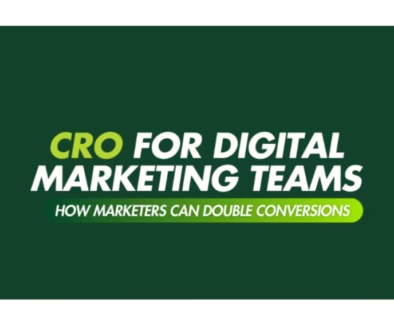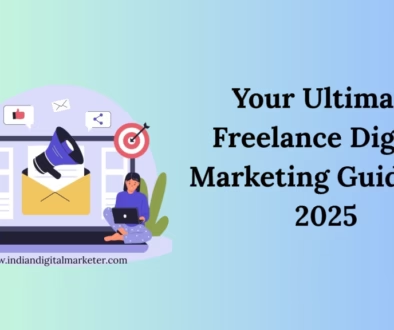How to become a certified digital marketer?
Hey there, future marketing superstar!
Look around you. Everyone is on their phones, scrolling through Instagram, searching on Google, or watching YouTube videos. This digital world is where businesses need to be, and they need skilled professionals to help them shine. That’s where a Certified Digital Marketer comes in.
You’ve probably heard the buzz. Digital marketing is the future, It’s a high-growth career, Great salaries! And it’s all true. But a question we hear all the time at IndianDigitalMarketer.com is, That’s great, but how do I actually start? How do I become a certified digital marketer?
If that’s you, you’re in the right place. Forget the confusion and overwhelming information. This is your clear, simple, and practical roadmap to launching a successful career in digital marketing.
Let’s dive in!
Why Bother with a Certification?
First things first, can’t you just learn from YouTube and call yourself a digital marketer? While self-learning is fantastic, a certification acts as your golden ticket. Here’s why:
Credibility and Trust: A certification from a reputable institution tells employers, “This person has formally studied and been tested on their skills.” It immediately sets you apart from the crowd.
Structured Learning Path: The digital marketing world is vast (SEO, SEM, SMM, and a dozen other acronyms!). A good certification program organizes this chaos into a logical, step-by-step curriculum, ensuring you don’t miss any crucial fundamentals.
Boosted Job Prospects: Many companies, especially in India’s competitive job market, use certifications as a filter. Having one on your resume can get your foot in the door for interviews you might otherwise miss.
Confidence to Execute: A certification isn’t just a piece of paper; it’s proof to yourself that you have the knowledge. It gives you the confidence to talk strategy, run campaigns, and deliver real results for clients or your employer.
Your 5-Step Roadmap to Becoming a Certified Digital Marketer
Before you even think about a certificate, you need to understand the building blocks of digital marketing. Think of these as your essential subjects.
Search Engine Optimization (SEO): This is the art and science of getting your website to rank higher on Google for free (“organic”) traffic. It involves understanding keywords, creating great content, and building a website Google loves.
Search Engine Marketing (SEM): This is the paid side of search engines, primarily through Google Ads. You learn how to run ad campaigns that appear at the top of search results, driving immediate traffic.
Social Media Marketing (SMM): This is more than just posting pretty pictures on Instagram. It’s about creating a strategy for platforms like Facebook, Instagram, LinkedIn, and X (Twitter) to build a community, drive engagement, and generate leads.
Content Marketing: Content is the fuel for everything else. This involves creating valuable and relevant blogs, videos, infographics, and ebooks to attract and retain a specific audience. Great content is the heart of great SEO and SMM.
Email Marketing: This is one of the most powerful tools for building a direct relationship with your audience. You’ll learn how to build email lists, write compelling newsletters, and nurture leads into customers.
Web Analytics: How do you know if any of your efforts are working? Analytics tools like Google Analytics help you track your website traffic, understand user behavior, and measure the success of your campaigns. Data is your best friend!
At IndianDigitalMarketer.com, we ensure our curriculum gives you a deep, practical understanding of each of these core pillars.
Step 2: Choose the Right Digital Marketing Certification
Now that you know the basics, it’s time to choose a program. Not all certifications are created equal. Here’s what to look for:
Comprehensive & Updated Curriculum: Does the course cover all the modules mentioned above? Is the content from 2025, not 2018? The digital world changes fast!
Focus on Practical Application: Theory is good, but practice is better. Look for programs that include live projects, case studies, and hands-on assignments. You need to do marketing, not just read about it.
Instructor Support & Mentorship: Can you ask questions and get answers from experienced mentors? Having a guide to help you when you’re stuck is invaluable.
Placement Assistance: A good institute doesn’t just give you a certificate; they help you build your resume, prepare for interviews, and connect you with job opportunities.
Top Certifications to Consider:
Google Digital Marketing & E-commerce Certificate: A great, free starting point to understand the fundamentals from the source itself.
HubSpot Academy: Offers excellent free certifications in specific areas like Content Marketing and Inbound Marketing.
Comprehensive Professional Certifications (like those at IndianDigitalMarketer.com): These paid programs are designed to be an all-in-one solution. They offer a deep, structured curriculum, live projects, dedicated mentorship, and crucial placement support, making you truly job-ready for the Indian market.
Step 3: Get Your Hands Dirty (Practical Experience is King!)
A certificate shows you have the knowledge. A portfolio shows you have the skill. You must apply what you’re learning.
Start a Personal Blog or Website: Pick a topic you’re passionate about (cooking, travel, tech, anything!). Apply your SEO skills to rank it. Use SMM to promote it. This becomes your personal marketing lab.
Offer to Help a Local Business: A friend’s small shop, a local cafe, or an NGO could all use help with their social media or website. Offer your services for free or a small fee. This gives you real-world experience and results to showcase.
Freelance on a Small Scale: Check out platforms like Upwork or Fiverr. Take on small, simple projects to build your portfolio and confidence.
Step 4: Build a Killer Digital Portfolio
Your resume lists your skills; your portfolio proves them. Create a simple one-page website or even a PDF document that showcases:
Your Certifications: List them prominently.
Your Projects: Link to the blog you started, the social media page you managed, or the Google Ads campaign you ran.
Use Case Studies: Don’t just show what you did; show the results. For example: “Managed the Instagram account for XYZ Cafe, increasing followers by 40% and engagement by 60% in 3 months using a content strategy focused on user-generated content.”
Step 5: Network and Build Your Personal Brand
The final step is to get yourself out there.
Optimize Your LinkedIn Profile: This is your professional digital identity. Use a professional photo, write a compelling headline (“Certified Digital Marketer | SEO & SMM Specialist”), and list your skills, certifications, and projects.
Connect with People: Follow industry leaders and marketing managers on LinkedIn and Twitter. Engage with their content thoughtfully.
Join Communities: Join digital marketing groups on Facebook, LinkedIn, or forums. Participate in discussions, ask questions, and offer help where you can. Communities, like the one we nurture for our students at IndianDigitalMarketer.com, are an incredible resource for support and job opportunities.
Your Journey Starts Now!
Becoming a certified digital marketer is not an overnight process, but it is an incredibly rewarding one. It’s a journey of continuous learning that opens doors to a dynamic, creative, and future-proof career.
The path is clear:
Learn the fundamentals.
Choose the right certification.
Practice with real projects.
Build your portfolio to showcase your skills.
Network to find opportunities.
Feeling inspired and ready to take the first step? At IndianDigitalMarketer.com, we’re here to guide you through every stage of this journey. We’ve designed our courses to be practical, comprehensive, and tailored to what Indian companies are looking for.
Ready to transform your career? Explore our certified digital marketing courses today and let’s build your future, together!

